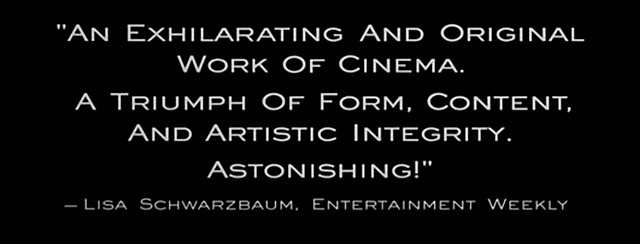In yesterday’s “Cannes Memory Fragment #1,” which recalled the 5.17.00 debut of Lars von Trier‘s Dancer in the Dark, Steven Gaydos dismissed the pretensions while proudly linking to Derek Elley’s 5.22.00 pan.
Elley excerpt #1: “The legend of Lars Von Trier — part deserved, part self-constructed — comes crashing to the ground with Dancer in the Dark, a 2 1/2-hour demo of auteurist self-importance that’s artistically bankrupt on almost every level.” Elley excerpt #2: “An attempt to feed off the heritage of the traditional Hollywood musical while reinterpreting it for a young, modern audience through the prism of Von Trier’s romantic fatalism.”
HE reply: Besides being emotionally ravishing and technically innovative, Dancer in the Dark is one of the very few form-altering musicals of the last 90 years.

For decades the basic premise of stage & screen musicals was a given — at various moments the characters are so seized with urgent, slap-happy emotion that they break into song. Songs were spirit-lifters, time-out celebrations.
Then came Oklahoma! on the B’way stage in ‘43 — song lyrics and dance or ballet moves were now integrated parts of the narrative, expressions of what characters were going through internally.
Then along came the 1964 musical playbook of A Hard Day’s Night — songs happen among members of a certain British rock band when whimsy or fantasy strike, or when it’s simply time to perform.
And then Cabaret (‘72) — songs not so much about this or that character’s emotional state but which offer ironic or bitter commentary about what an entire culture is going through, and only expressed on-stage in the Kit Kat Club (except for “Tomorrow Belongs To Me”).
And then Dennis Potter‘s 1978 TV drama Pennies From Heaven (followed by Herbert Ross‘s 1981 feature remake), in which Depression-era characters lip-synched popular ’30s tunes as a means of fantasy-escaping from poverty and cruel fates.
Then came Dancer In The Dark (‘00) — a woman is so unable to handle the pain, cruelty and rough & tumble of life that she retreats into song and dance fantasies — without them she can’t continue, can’t cope. And of course this sad but inwardly joyous failing, this neurotic avoidance syndrome leads to tragedy.
How Derek Elley managed to not only miss but dismiss and deplore this simple transcendent concept (not to mention Von Trier’s revolutionary technique of capturing these musical sequences with several strategically mounted vidcams) was, for me, mind-blowing.
It was this review that reminded me all the more that effete, scholarly film dweebs are often (or at the very least sometimes) indifferent or hostile to strongly conveyed, take-it-or-leave-it emotion.









